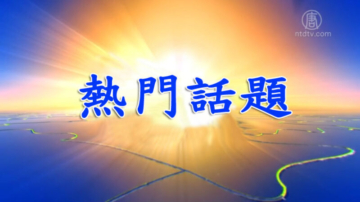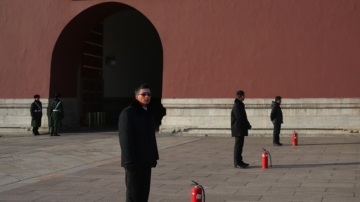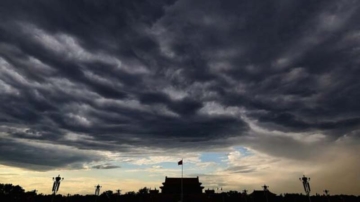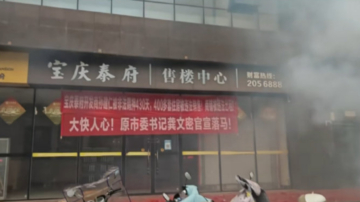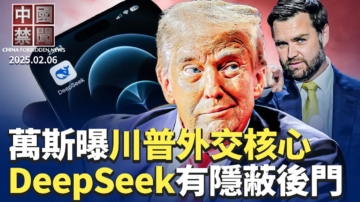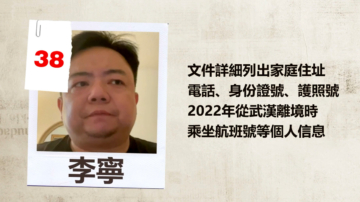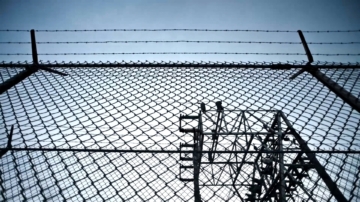【新唐人2012年10月17日訊】中共喉舌《新華社》報導,從2007年中共十七大以來,中國共有66萬多人因違法違紀被查,其中包括薄熙來、劉志軍、許宗衡等一批大案要案。但有學者說,中共在掌握政權之後,為了延續「獨裁統治」,而幫那些統治階層從內部謀取福利,所以造成了無官不貪的局面。
10月15號,《新華社》報導列舉了來自中共紀委監察部的統計數字:從2007年11月至今年6月,全中國紀檢監察機關共接受信訪舉報案件660萬6千多件,立案64萬3千多件,結案6 3萬9千多件,給予黨紀政紀處分6 6萬8千多人。
報導還說,中共中央紀委監察部嚴肅查處了薄熙來、劉志軍、許宗衡等一批大案要案,還有像包括康日新、黃瑤、王益、張家盟、劉卓志、黃勝等違紀違法高官。
法學和中國問題研究專家趙遠明指出,薄熙來在這60多萬貪官中是屬於比較特殊和拔尖的。而從海外媒體的披露可以看出,薄熙來轉移到國外的錢大約就有60億美元;他玩的女人至少100多位,而且其中2、30位是公眾人物;他還有計劃的去拉攏軍隊、和國內外媒體以及一些作家為他造勢,企圖在18大後把習近平弄下去。
法學和中國問題研究專家趙遠明:「他不但貪腐,他還要篡奪政權。他貪這麼多錢跟軍隊拉關係,搞軍隊的支持者,有可能武裝奪取政權或者用軍隊做他背後的支持和靠山。」
在此之前,《新華社》也有報導,中共政治局常委、中紀委負責人賀國強,在日前召開的「中央反腐敗協調小組第22次會議」上說,從2007年11月至今年6月,受到全中國紀檢監察機關所謂「黨紀、政紀處分」的有66萬多人,「涉嫌犯罪移送司法機關處理」2萬4千多人。
為甚麼受到「黨紀、政紀處分」的人數要遠遠超過「移送法辦」的人數,外界都想探究原因。
美「中國社會民主黨--中央委員會」主持人劉因全:「有一些理應該判刑的,可能由於他這個派系的人來保護他,最後就免於刑事處分了。像薄熙來這麼多罪行,活體摘除器官,屍體加工廠,涉及殺人命案,這麼大規模的、高額的貪污腐敗,這些都是應該判處死刑立即執行的,最後弄不好又判一個死刑緩期執行算了。」
美國的「中國社會民主黨--中央委員會」主持人劉因全還指出,在一黨專制的情況下,法院、檢察院、公安局都受黨的領導,很多懲處都由「政法委」指定結果,加上中共官員們官官相護、互抱成團,無法真正按照法律對他們嚴格判處。
北京「理工大學」教授胡星斗曾經計算過,大概只有百分之一不到的中國貪官被查處。他對《美國之音》表示,被移送法辦的官員,通常是沒能得到權力網庇護或者被邊緣化的人。
趙遠明認為,中共在掌握政權之後,首要任務就是延續獨裁統治,然後為這些統治階層謀福利,所以造成了無官不貪,和貪腐的風氣和潮流。
趙遠明:「它打著反貪腐的旗號,以便迷惑民心,然後獲取民眾的支持和同情。二來,利用貪腐可以把它幹部隊伍當中不太聽話的,或者工作能力差又腐敗的這些人給他打掉、踢出去。」
胡星斗指出,中紀委查處腐敗官員的力度遠遠跟不上腐敗案件滋生的速度,社會制度不改,靠中紀委這樣的黨內機構不能解決根本問題。
可是,「中國人民銀行」網站去年6月,引述「中國社會科學院」的調研資料顯示:從上世紀90年代中期以來,外逃幹部16000-18000人,攜帶款項達8000億元人民幣,平均每名接近5千萬。
到底眾多的中國貪官貪污了多少錢財?沒有人能提供答案。
採訪/李韻 編輯/宋風 後製/王明宇
660,000 corrupt officials with 20,000 punished
CCP mouthpiece Xinhua News Agency reported, a total of
more than 660,000 corrupt officials in China have been checked for violating the law
and discipline since the 17th Communist Party Congress
in 2007, including Bo Xilai, Liu Zhijun, Xu Zongheng and other major cases.
However, scholars said that, after taking power,
the CCP helped the ruling class benefit to help the continuation of the one party dictatorship.
On Oct. 15th, Xinhua News Agency cited statistics
from the Ministry of Supervision of the CCP Discipline
Inspection Commission:
from November 2007 to June 2012,
discipline inspection and supervision organs received
6,600,006 thousand reported cases.
They filed 640,003 thousand cases, closed 6329,000 cases
and punished more than 668,000 people by CCP discipline.
It was reported that, the Ministry of Supervision of the CCP
Discipline Inspection Commission seriously dealt with Bo Xilai,
Liu Zhijun, Xu Zongheng and other major cases, including
Kang Rixin, Huang Yao, Wang Yi, Zhang Jiameng,
Liu Zhuozhi, Huang Sheng and other senior officials.
Zhao Yuanming, expert of law and Chinese Studies
pointed out, Bo Xilai is special and top-notch among more than 600,000 corrupt officials.
According to the disclosures from overseas media, the amount
of money Bo Xilai transferred abroad is about $ 6 billion USD,
and he played with more than 100 women,
20-30 of whom are public figures.
He also planned to win over the military, the foreign media,
as well as some of the writers to get Xi Jinping down in the 18th CCP National Congress.
Zhao Yuanming: “He focused on money and also on power.
He used the dirty money to build connections with armies
and find supporters.
It is possible for him to get the support
of the army for taking his position.”
Before this news, Xinhua News Agency also reported that
He Guoqiang, member of the Standing Committee of the
Politburo and also the head of CCP Discipline Inspection
Commission announced at the 22nd meeting of the Central Anti-Corruption Coordination Group,
from November 2011 to June 2012, there were more than
660,000 people punished by the inspection organs with so-called “party discipline”,
and more than 24,000 were transferred to judicial organs for
suspicion of having committed crimes.
Why is the number of people punished by party discipline
much more than the number of people brought to justice?
The outside world wants to explore the reasons.
Liu Yinquan, the host of the Central Committee of the Chinese
Social Democratic Party: “Some people should be sentenced,
but they are protected by his/her faction and finally
exempted from criminal punishment.
The offences of Bo Xilai include live organ harvesting,
corpse processing plants, murders and large-scale corruption.
Therefore, Bo Xilai should be sentenced to death with
immediate enforcement. But he may just be sentenced to death with reprieve.”
Liu Yinquan also pointed out, in the case of one-party rule,
court, procuratorate, public security bureau are led by the party,
and a lot of punishments are just specified decisions
made by the Politics and Law Committee.
Besides, CCP officials like to hold each other into a group,
then they may protect others from being punished with just sentencing in law.
Hu Xingdou, a professor at Beijing Institute of Technology
once calculated that, probably less than one percent of the Chinese corrupt officials were investigated.
He said to Voice of America, officials who were brought
to justice may be marginalized people
or those who failed to get protection from the power
safety net protecting those at higher level.
Zhao Yuanming thought, after the CCP took power,
it took the continuation of dictatorship as being of primary importance.
Therefore, the CCP just provides benefits for
the ruling class and leaves a trend of corruption.
Zhao Yuanming: “CCP just uses the anti-corruption
banner to confuse people and get their support.
Besides, the CCP can also kick out corrupt officials
who are less obedient or of low competence by using the anti-corruption banner.”
Hu Xingdou said, the investigation intensity of the CCP
Discipline Inspection Commission lags far behind the growing rate of corruption cases.
Fundamental problems cannot be solved by inner-party
institutions, if the social system does not change.
However, the website of People's Bank of China cited the
research data of Chinese Academy of Social Sciences last
June and mentioned, since the mid-1990s, there have been
16000-18000 officials who have absconded,
and what they carried amounted to 800 billion RMB-
an average of fifty million RMB each.
However, no one can provide a figure for the amount of
dirty money handled by corrupt CCP officials.
10月15號,《新華社》報導列舉了來自中共紀委監察部的統計數字:從2007年11月至今年6月,全中國紀檢監察機關共接受信訪舉報案件660萬6千多件,立案64萬3千多件,結案6 3萬9千多件,給予黨紀政紀處分6 6萬8千多人。
報導還說,中共中央紀委監察部嚴肅查處了薄熙來、劉志軍、許宗衡等一批大案要案,還有像包括康日新、黃瑤、王益、張家盟、劉卓志、黃勝等違紀違法高官。
法學和中國問題研究專家趙遠明指出,薄熙來在這60多萬貪官中是屬於比較特殊和拔尖的。而從海外媒體的披露可以看出,薄熙來轉移到國外的錢大約就有60億美元;他玩的女人至少100多位,而且其中2、30位是公眾人物;他還有計劃的去拉攏軍隊、和國內外媒體以及一些作家為他造勢,企圖在18大後把習近平弄下去。
法學和中國問題研究專家趙遠明:「他不但貪腐,他還要篡奪政權。他貪這麼多錢跟軍隊拉關係,搞軍隊的支持者,有可能武裝奪取政權或者用軍隊做他背後的支持和靠山。」
在此之前,《新華社》也有報導,中共政治局常委、中紀委負責人賀國強,在日前召開的「中央反腐敗協調小組第22次會議」上說,從2007年11月至今年6月,受到全中國紀檢監察機關所謂「黨紀、政紀處分」的有66萬多人,「涉嫌犯罪移送司法機關處理」2萬4千多人。
為甚麼受到「黨紀、政紀處分」的人數要遠遠超過「移送法辦」的人數,外界都想探究原因。
美「中國社會民主黨--中央委員會」主持人劉因全:「有一些理應該判刑的,可能由於他這個派系的人來保護他,最後就免於刑事處分了。像薄熙來這麼多罪行,活體摘除器官,屍體加工廠,涉及殺人命案,這麼大規模的、高額的貪污腐敗,這些都是應該判處死刑立即執行的,最後弄不好又判一個死刑緩期執行算了。」
美國的「中國社會民主黨--中央委員會」主持人劉因全還指出,在一黨專制的情況下,法院、檢察院、公安局都受黨的領導,很多懲處都由「政法委」指定結果,加上中共官員們官官相護、互抱成團,無法真正按照法律對他們嚴格判處。
北京「理工大學」教授胡星斗曾經計算過,大概只有百分之一不到的中國貪官被查處。他對《美國之音》表示,被移送法辦的官員,通常是沒能得到權力網庇護或者被邊緣化的人。
趙遠明認為,中共在掌握政權之後,首要任務就是延續獨裁統治,然後為這些統治階層謀福利,所以造成了無官不貪,和貪腐的風氣和潮流。
趙遠明:「它打著反貪腐的旗號,以便迷惑民心,然後獲取民眾的支持和同情。二來,利用貪腐可以把它幹部隊伍當中不太聽話的,或者工作能力差又腐敗的這些人給他打掉、踢出去。」
胡星斗指出,中紀委查處腐敗官員的力度遠遠跟不上腐敗案件滋生的速度,社會制度不改,靠中紀委這樣的黨內機構不能解決根本問題。
可是,「中國人民銀行」網站去年6月,引述「中國社會科學院」的調研資料顯示:從上世紀90年代中期以來,外逃幹部16000-18000人,攜帶款項達8000億元人民幣,平均每名接近5千萬。
到底眾多的中國貪官貪污了多少錢財?沒有人能提供答案。
採訪/李韻 編輯/宋風 後製/王明宇
660,000 corrupt officials with 20,000 punished
CCP mouthpiece Xinhua News Agency reported, a total of
more than 660,000 corrupt officials in China have been checked for violating the law
and discipline since the 17th Communist Party Congress
in 2007, including Bo Xilai, Liu Zhijun, Xu Zongheng and other major cases.
However, scholars said that, after taking power,
the CCP helped the ruling class benefit to help the continuation of the one party dictatorship.
On Oct. 15th, Xinhua News Agency cited statistics
from the Ministry of Supervision of the CCP Discipline
Inspection Commission:
from November 2007 to June 2012,
discipline inspection and supervision organs received
6,600,006 thousand reported cases.
They filed 640,003 thousand cases, closed 6329,000 cases
and punished more than 668,000 people by CCP discipline.
It was reported that, the Ministry of Supervision of the CCP
Discipline Inspection Commission seriously dealt with Bo Xilai,
Liu Zhijun, Xu Zongheng and other major cases, including
Kang Rixin, Huang Yao, Wang Yi, Zhang Jiameng,
Liu Zhuozhi, Huang Sheng and other senior officials.
Zhao Yuanming, expert of law and Chinese Studies
pointed out, Bo Xilai is special and top-notch among more than 600,000 corrupt officials.
According to the disclosures from overseas media, the amount
of money Bo Xilai transferred abroad is about $ 6 billion USD,
and he played with more than 100 women,
20-30 of whom are public figures.
He also planned to win over the military, the foreign media,
as well as some of the writers to get Xi Jinping down in the 18th CCP National Congress.
Zhao Yuanming: “He focused on money and also on power.
He used the dirty money to build connections with armies
and find supporters.
It is possible for him to get the support
of the army for taking his position.”
Before this news, Xinhua News Agency also reported that
He Guoqiang, member of the Standing Committee of the
Politburo and also the head of CCP Discipline Inspection
Commission announced at the 22nd meeting of the Central Anti-Corruption Coordination Group,
from November 2011 to June 2012, there were more than
660,000 people punished by the inspection organs with so-called “party discipline”,
and more than 24,000 were transferred to judicial organs for
suspicion of having committed crimes.
Why is the number of people punished by party discipline
much more than the number of people brought to justice?
The outside world wants to explore the reasons.
Liu Yinquan, the host of the Central Committee of the Chinese
Social Democratic Party: “Some people should be sentenced,
but they are protected by his/her faction and finally
exempted from criminal punishment.
The offences of Bo Xilai include live organ harvesting,
corpse processing plants, murders and large-scale corruption.
Therefore, Bo Xilai should be sentenced to death with
immediate enforcement. But he may just be sentenced to death with reprieve.”
Liu Yinquan also pointed out, in the case of one-party rule,
court, procuratorate, public security bureau are led by the party,
and a lot of punishments are just specified decisions
made by the Politics and Law Committee.
Besides, CCP officials like to hold each other into a group,
then they may protect others from being punished with just sentencing in law.
Hu Xingdou, a professor at Beijing Institute of Technology
once calculated that, probably less than one percent of the Chinese corrupt officials were investigated.
He said to Voice of America, officials who were brought
to justice may be marginalized people
or those who failed to get protection from the power
safety net protecting those at higher level.
Zhao Yuanming thought, after the CCP took power,
it took the continuation of dictatorship as being of primary importance.
Therefore, the CCP just provides benefits for
the ruling class and leaves a trend of corruption.
Zhao Yuanming: “CCP just uses the anti-corruption
banner to confuse people and get their support.
Besides, the CCP can also kick out corrupt officials
who are less obedient or of low competence by using the anti-corruption banner.”
Hu Xingdou said, the investigation intensity of the CCP
Discipline Inspection Commission lags far behind the growing rate of corruption cases.
Fundamental problems cannot be solved by inner-party
institutions, if the social system does not change.
However, the website of People's Bank of China cited the
research data of Chinese Academy of Social Sciences last
June and mentioned, since the mid-1990s, there have been
16000-18000 officials who have absconded,
and what they carried amounted to 800 billion RMB-
an average of fifty million RMB each.
However, no one can provide a figure for the amount of
dirty money handled by corrupt CCP officials.

